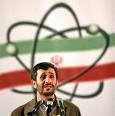The Latest from Iran (29 November): Iran's Nuclear Bluff
 Sunday, November 29, 2009 at 13:23
Sunday, November 29, 2009 at 13:23  2055 GMT: No Big Deal for Engagement. Iran's declaration of plans for "10 enrichment plants" changes little in the political equation. Here is the statement from British Foreign Minister David Miliband:
2055 GMT: No Big Deal for Engagement. Iran's declaration of plans for "10 enrichment plants" changes little in the political equation. Here is the statement from British Foreign Minister David Miliband:We have stated over and again that we recognise Iran's right to a civilian nuclear programme, but they must restore international confidence in their intentions. Instead of engaging with us Iran chooses to provoke and dissemble. Iran can flaunt its isolation but this will only increase the calm, determination and unity of the international community. I urge Iran to recognise this, and to accept the outstretched hand on offer.
2020 GMT: A Holiday from Protests. Pedestrian has noted the Government's sudden declaration that schools will be closed on 14 Azar (5 December) and that Government offices must give employees the day off if they wish. As 15 Azar (6 December) is already a holiday for Eid-e Ghadir, Pedestrian summarises:
This means that on Monday, 16 Azar, the day of the student demonstrations, many students will be away on holiday. Workers and employees will not able to take some of the day off having just gotten back after a 4 day holiday [Thursday --- some government offices, all universities and some schools are closed on Thursdays --- Friday, Saturday and Sunday]. More importantly, this will also mean that the crucial days before the demonstrations, all schools will be closed and students will not have the chance to do last minute planning.
This is not a new trick: I recall that, earlier in the post-election crisis, the Government also offered a last-minute holiday before one of the mass gatherings.
NEW Today’s Iran Non-Story: Some Guy Who Looked Like Ahmadinejad Protested in 1984
NEW Video: The Mothers of Martyrs Protest (28 November)
NEW Iran: The Routes of 16 Azar
Iran’s Nukes: Obama’s Team Buys Time for Engagement
Iran: The Campaign to Free Atefeh Nabavi
The Latest on Iran (28 November): Turning Attention Back to Tehran
1944 GMT: Advar News has posted a story and photographs of today's protest at Tehran University.
1930 GMT: Sigh. After the rush of of political manoeuvring this morning, little news coming out from inside Iran. Instead, the "Western" media has gone viral over the "10 enrichment plants" story (see 1635 GMT). This is understandable, as it fits the narrative of devious Iran.
It also ignores the political dynamics: this is the logical (if ham-fisted) symbolic response to the "third-party enrichment" deal, keeping the uranium stock inside Iran. It ignores the technical issue that Iran does not have the uranium supply to keep its primary enrichment facility at Natanz 100% busy, let alone 10 more (see 1645 GMT).
And, perhaps surprisingly, the media are not even reflecting on their shock-horror claim that Iran is making this move to control the process of 20% enrichment for its medical research reactor. That's a civilian use of uranium, a long way from the "Iran is on the verge of military capability" narrative.
1700 GMT: Nukes Plus Internal Situation = A Challenge? And while everybody watches the Parliament and Government strike their poses, here comes Hashemi Rafsanjani. The former President has used a speech today to twin the latest on the nuclear issue with a swipe at the internal situation. After criticising the IAEA resolution, Rafsanjani declared that "street violence is caused by the lack of an atmosphere of free criticism".
1645 GMT: Why the Government Response is a Bluff. While Western media quickly seizes on the Government's declaration of 10 new enrichment plants, consider this: the immediate problem for Iran is not enrichment capacity but the lack of uranium stock. The response to the IAEA resolution means little unless Tehran can establish new lines of uranium supply.
1635 GMT: The Nuclear Response. The Parliament appears to have established its challenge not only to the "West" but to President Ahmadinejad. It has approved a resolution asking Ahmadinejad to submit plans for reduced interaction with the International Atomic Energy Agency.
However, the most recent development indicates that the Government will not have to be pushed, at least in the symbolic short-term. Iranian state television reports that the Government, declaring that it will ensure the production of 20 percent uranium for civilian use, has approved plans to build 10 new uranium enrichment plants. The Iranian nuclear agency has been instructed to begin construction on five plants, with locations for five more to be established over the next two months.
1630 GMT: Report that university lecturer, journalist, and activist Dr. Fayaz Zahed has been released on bail after 80 days in detention.
1325 GMT: Fighting the Velvet Revolutionaries. The Iranian Parliament passed a law today earmarking $20 million to "support progressive currents that resist illegal activities by the governments of the US and Britain", to "confront plots and unjust restrictions" by Washington and London against Tehran, and to disclose "human rights abuses by the two countries".
The proposal of the $20 million was tabled months ago, and there had been reports that up to $50 million would be sought.
A committee with representatives from Iran's intelligence services, the Islamic Revolutionary Guard Corps, the Foreign Ministry, and the communication and culture ministries will oversee the funds.
1140 GMT: Today's Media Iran Low-Light. The Mail on Sunday in Britain has a classic non-story about someone who is probably Mahmoud Ahmadinejad who protested in London in 1984. We've bowed down to this journalistic triumph in a separate entry.
1115 GMT: We've posted a video of yesterday's weekly gathering of the "Mothers of Martyrs" and sympathisers at Laleh Park in Tehran.
1023 GMT: More Detainee Testimony. An EA reader follows up the account of a detainee in Evin Prison (see 0805 GMT) with the letter from lawyer and human rights activist Heshmatollah Tabarzadi to the Supreme Leader. The reader has kindly provided an English translation on a video featuring the letter, which details abuses of detainees.
0813 GMT: Half the Story. Press TV has posted the Ali Larijani comments denouncing the IAEA resolution on Iran's nuclear programme (see 0755 GMT):
If you keep up this ludicrous carrot and stick policy, Iran will make 'new arrangements' in its interaction with the Agency. The resolution passed by the Board of Governors shows that we must be more alert when considering their proposals. This motion shows that they had no intention whatsoever to negotiate a solution but were engaged in "political chicanery”.
No mention, however, in the Press TV article that Larijani has been a determined foe of the Government's strategy and that this could be part of a broader Parliamentary challenge to President Ahmadinejad.
0810 GMT: We've split off our first update of the morning, "The Routes of 16 Azar", as a separate analysis.
0805 GMT: EA readers point me to the account of a detainee who spent 21 months in Evin Prison for political activities, "Abandon Hope All Ye Who Enter Here".
0755 GMT: Here Comes Larijani. Speaker of Parliament Ali Larijani, who has been hostile toward a nuclear deal to the point of challenging President Ahmadinejad, told Parliament today, "If the West continues to pressure us, then parliament can review Iran's cooperation level with the IAEA."
More important than any threat to suspend inspections or even leave the Non-Proliferation Treaty is Larijani's growing confidence. The IAEA resolution is a boost for him, as it helps him play the nationalist card against a Government that has been eager to engage with the "West", especially the US.
Indeed, if I was playing cynical politics, I would suggest that continuing the threat of sanctions and denouncing Iran's motives is a way to build up an alternative to President Ahmadinejad, especially as Larijani has been linked to an even bigger post in a National Unity Plan.
But Washington can't be looking that many moves ahead, can it?
0745 GMT: Brazil Says No Sanctions. A quick post-script on the International Atomic Energy Agency resolution on Iran's nuclear programme: Brazil's ambassador to the IAEA is making clear that his country stands against harsher measures, as sanctions "will only lead to a hardening of the Iranian position". Brazil abstained in the IAEA vote.
The South American country has no seat on the United Nations Security Council, so the statement is more significant as an indicator that major countries outside the Council may stand back from any US-led effort to turn from engagement to confrontation.

 This analysis by Agh Bahman, via the blog of Pedestrian,
This analysis by Agh Bahman, via the blog of Pedestrian,  Yesterday an EA reader sent me this thoughtful and challenging comment:
Yesterday an EA reader sent me this thoughtful and challenging comment: 2030 GMT: Punishment Going Up. Reports now indicate that Ahmad Zeidabadi, whose sentencing we reported earlier (1620 GMT),
2030 GMT: Punishment Going Up. Reports now indicate that Ahmad Zeidabadi, whose sentencing we reported earlier (1620 GMT),  Yesterday, I noticed
Yesterday, I noticed